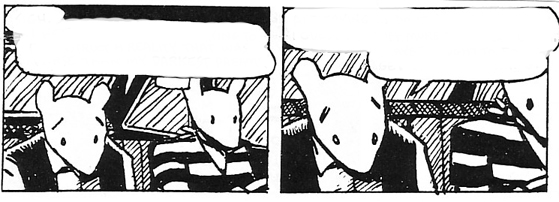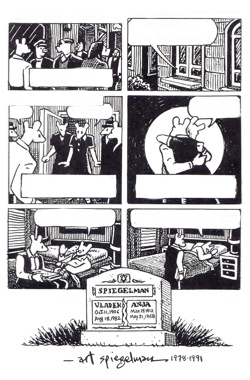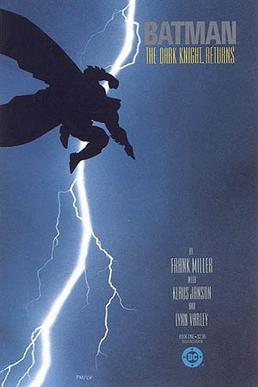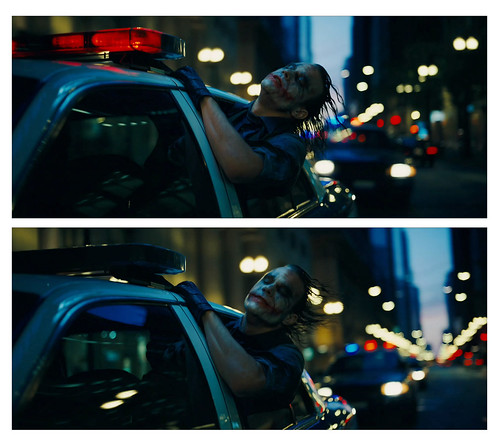Much has been written about the digital revolution and what it portends for the regular reading experience. I don’t want to add too many more vagaries to already nebulous philosophizing, but I read the webcomics this week with great interest in the actual experience.
The newer (flash-powered?) Bayou was clearly the more immersive of the two. True, it wasn’t perfect—the navigation bar often obscured critical text until I clicked to hide it—but it certainly felt more like a page on a book, in contrast to the ads, extraneous text, and choppy chapter transitions on Shooting War’s site.
That said, as a very casual web-designer, I can understand the appeal of the barebones, simple html of Shooting War. It’s easy to create and maintain, in keeping with the stereotypic punk ethos of its “radical” political message; Bayou is part of a much more “mainstream” portal that features work from many of the major publishers. Likewise, I can understand why the well-funded Bayou host could forgo ads, whereas the poorer Shooting War could manage the swallow the ironic pill of ever-present, sponsored entreaties.
I read both comics on an old PC on campus. It was slightly weird to pore over a static image in the glow of a stationary monitor after the relative freedom of thumbing through a book throughout the course. Granted, I am not one of the lucky masses to own an iPhone yet (let alone an iPad), but I can see those devices becoming much more enjoyable readers for this type of medium. In fact, I suspect that I’m more tolerant of the electronic glow for this type of presentation than I am for text alone (I confess I find Kindles and iPads equally unsatisfying for a good sit-down read).
Anchored to my desk chair, I did appreciate the left-over outlines in some frames of the Bayou preview—somehow it definitely helped make the experience more organic and deceivingly tactile. That said, I was unable to zoom in on details as promised by the beginning instructions (perhaps a problem of my web browser?) This problem was just as great in the text-heavy Shooting War, where I had to resort to keyboard tricks to force my browser to zoom in on the abundant amount of text. Moreover, as I’m sure others noted, several images on the Shooting War site are noted as “moved/deleted.”
Which of course is the problem of all these reading experiences. When a book is printed, everyone experiences it in the same way, relatively speaking. When something is printed online, the reading experience is disconcertingly fluid. This is symptomatic, of course, of a huge range of software and hardware variation–I still remember the shock I felt a decade ago when I realized pictures that were beautifully edited on my home computer looked like blown-out, pixellated crap on others.
The video this week from the MIT lecture was introduced with the intriguing statement that “media is something we do.” It is the possibility of audience participation that is perhaps one of the most intriguing possibilities of online publishing. Of the two, it is most clearly explored via Shooting War, where readers from around the world weigh in with their take on the hyperbolic political messages therein. At times, the weight of the unseen comments awaiting a simple scroll down from the comic was nothing if not distracting—but a quick scan showed the comments to be surprisingly on-topic and intelligent—at least, as far as internet comments go!
Anyway, as a reader, small-time lit journal web editor, and potential future online GN contributor, I continue to be fascinated by the online reading experience and the challenges therein. If nothing else, now is a good time to find friends with mad web and programming skillz–or maybe learn (more than?) a few ourselves.




 It just doesn’t work. Pretty much every story I’ve ever encountered that’s involved time travel is inevitably derailed by the paradoxes of relying on said plot device. From old Star Trek episodes to Lost, from Terminator to The Lake House, my disdain for the convention has only grown. Each plot devolves into a repetitive loop of causality that simply, aggravatingly doesn’t make sense. It’s true that 12 Monkeys—and its infinitely better predecessor, La Jetée—plays with this very idea, but the sight of Bruce Willis screwing up his own life for eternity was every bit as shallow (if beautifully designed) as it would later be in his Disneyfied attempt to redeem it in The Kid.
It just doesn’t work. Pretty much every story I’ve ever encountered that’s involved time travel is inevitably derailed by the paradoxes of relying on said plot device. From old Star Trek episodes to Lost, from Terminator to The Lake House, my disdain for the convention has only grown. Each plot devolves into a repetitive loop of causality that simply, aggravatingly doesn’t make sense. It’s true that 12 Monkeys—and its infinitely better predecessor, La Jetée—plays with this very idea, but the sight of Bruce Willis screwing up his own life for eternity was every bit as shallow (if beautifully designed) as it would later be in his Disneyfied attempt to redeem it in The Kid. True, are Jon’s pretentious metaphysical soundbytes even a serious story point? By the end of the story, as he fails to “save the day,” I can see why Moore would want to play with diluting the power of a too-perfect, too-omniscient hero—an ultimately fatalistic subversion that goes more than a step further than the grit of Miller’s Dark Knight. Indeed, the bitter deconstruction of all of society’s ideals is the real, persistent discussion drummed into our heads throughout Watchmen—and it’s a bleak one. Which I guess Jon’s soundbytes do reinforce…
True, are Jon’s pretentious metaphysical soundbytes even a serious story point? By the end of the story, as he fails to “save the day,” I can see why Moore would want to play with diluting the power of a too-perfect, too-omniscient hero—an ultimately fatalistic subversion that goes more than a step further than the grit of Miller’s Dark Knight. Indeed, the bitter deconstruction of all of society’s ideals is the real, persistent discussion drummed into our heads throughout Watchmen—and it’s a bleak one. Which I guess Jon’s soundbytes do reinforce…
 The question of “evil” and what exactly we as society and as individuals are supposed to do about it is one that has haunted everyday conversations for quite some time now. In a post-911 world, replete with hooded POWs having their heads hacked off and humiliated Abu Ghraib prisoners having their genitals shocked, the Jack Bauer–fueled belief that “the ends justify the means” has never been more hotly debated.
The question of “evil” and what exactly we as society and as individuals are supposed to do about it is one that has haunted everyday conversations for quite some time now. In a post-911 world, replete with hooded POWs having their heads hacked off and humiliated Abu Ghraib prisoners having their genitals shocked, the Jack Bauer–fueled belief that “the ends justify the means” has never been more hotly debated. But at the end of the day, I can’t help but observe that the masses are titillated by the arc of blood streaming from the mutants’ bloody nose at the end of Book 1, fascinated by the gorgeous bokeh twinkling behind Ledger’s grease-painted face rapturously speeding down the city’s nighttime street…and rather powerfully seduced by the siren call of what Miller calls “the forceful, violent aspect of the will.”
But at the end of the day, I can’t help but observe that the masses are titillated by the arc of blood streaming from the mutants’ bloody nose at the end of Book 1, fascinated by the gorgeous bokeh twinkling behind Ledger’s grease-painted face rapturously speeding down the city’s nighttime street…and rather powerfully seduced by the siren call of what Miller calls “the forceful, violent aspect of the will.”